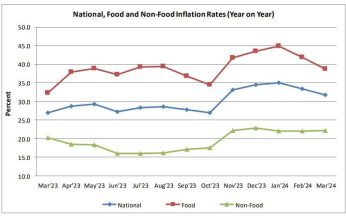Trading our treasures
A national treasure is simply defined as something that has significant importance for a particular country.
Basically, it is the massive cultural, geographic and/ or economic importance of something that qualifies it to be a national treasure. Victoria Falls, for instance, is a national treasure for both Zambia and Zimbabwe. One, it is a very popular tourist destination that brings in revenue for these countries, and two, it has been listed as one of the wonders of the world.
Likewise, Malawi has Lake Malawi – the third largest lake in Africa, ninth in the world; Mulanje Mountain – one of the highest peaks in southern Africa; Liwonde National Park – a place very rich in wildlife in this part of Africa; etc as its national treasures.
However, it is clear that some of the projects that we are hell-bent on pursuing as a nation for example oil and gas exploration on Lake Malawi, extensive rare earth mining on Mulanje Mountain, and the recent reports about building a shopping mall at the Njamba Freedom Park, won’t leave any treasures for Malawi’s next generation to cherish.
At this point, one wonders: have we realised the full economic potential of our national treasures in their natural state to warrant trading them for some misguided projects?
First, there is a general belief that we have not explored the untapped potential of our treasures in their current states and/ or forms.
For illustration purpose, here are some fast facts about our treasures under discussion. One, our lake has more species of fish than any other body of fresh water in the world! Two, Mulanje Mountain is on the verge being named a Unesco World Heritage site, i.e. a place of extraordinary natural beauty and cultural richness. And three, Njamba Freedom Park is a historical place as it hosted Pope John Paul II in 1989, besides hosting multiparty rallies in the early 1990s.
Now, the question is: how far have we gone in marketing, and benefitting from this potential as a country? We ought to be talking about exporting our fish, making our mountain a popular tourist destination and our park a must-see place for the 1.2 billion Roman Catholics in the world, rather than pursuing these exploitative projects.
Surely, these initiatives would bring in the money we are looking for. In addition, we would gain more as a country, from sales revenue, for example, unlike from the pathetic royalties we are getting from most of these foreign-investor-led projects – Kayelekera Uranium mine being a classic example.
Second, it seems like we are deliberately overlooking the social costs associated with trading our treasures for these exploitative projects.
In the simplest of terms, social cost is defined as the damage suffered by the general society resulting from any activity. In this context, some of the social costs would be relocations, a compromised source of income for our fishermen and compromised fish consumption for the public, radioactive-related diseases for employees and communities surrounding the mining sites (haven’t we read about this in our dailies already?), etc.
Again, the question is: are we blind to the fact that the cost to be borne by the ordinary Malawian is higher than the mediocre returns that we get from such projects? It seems like we have developed a habit of getting ourselves into unfamiliar territories without conducting thorough cost-benefit analyses.
From the foregoing discussion, therefore, one can safely conclude that we seem not to know the value of the treasures that we have as a nation. One would go further to say that this situation becomes more pathetic, as we have all seen, when an ordinary Malawian bears the cost of trading our treasures for some projects that do not benefit us as a country.
Basically, we seem to be way too comfortable with the poor returns that we get from some of these foreign-investor-led projects that we cannot think of the ways of getting the best out of our national treasures on our own. One Elia Theu sums it up well when he says “we Malawians seem to be satisfied with chicken soup instead of going for the actual chicken”.





